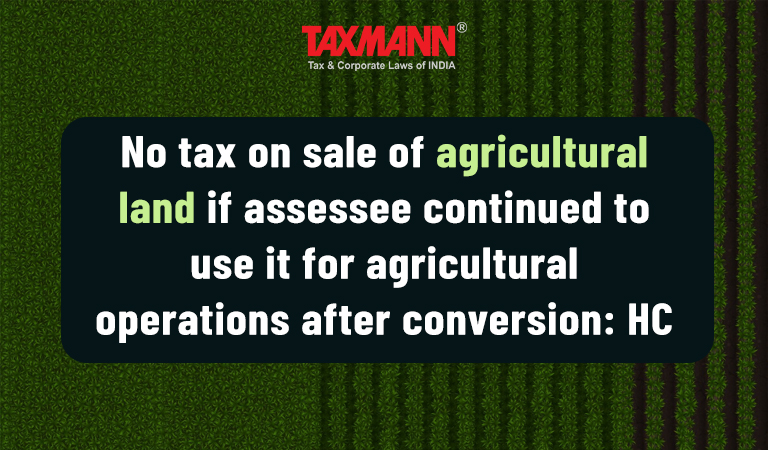No tax on sale of agricultural land if assessee continued to use it for agricultural operations after conversion: HC
- Blog|News|Income Tax|
- 2 Min Read
- By Taxmann
- |
- Last Updated on 6 October, 2022

Case Details: CIT v. M.R. Anandaram (HUF) - [2022] 142 taxmann.com 403 (Karnataka)
Judiciary and Counsel Details
-
- P.S. Dinesh Kumar & C.M. Poonacha, JJ.
- E.T. Sanmathi, Adv. for the Appellant.
- A. Shankar, Sr. Adv. & M. Lava, Adv. for the Respondent.
Facts of the Case
The assessee was a Hindu Undivided Family (HUF) that owns several pieces of agricultural land. During the relevant assessment year, the assessee sold agricultural lands after converting them into non-agriculture land. The assessee filed the return of income without showing any capital gains from the sale of lands.
Assessing Officer (AO) contended that lands sold by them were capital assets and the capital gains arising on the said assets were chargeable to tax. On appeal, the CIT(A) also confirmed the order of AO which was later reversed by the Tribunal.
Aggrieved revenue filed the instant appeal before the Karnataka High Court.
High Court Held
The Karnataka High Court held that the Tribunal had duly recorded that the assessee had continued agricultural operations on the land though such land was converted. It was also evident from the fact that income derived from agricultural operations was accepted by the revenue.
Revenue also failed to bring on record to suggest that the lands were used for any other purpose other than cultivation after conversion. Further, the certificate of Senior Assistant Director of Horticulture also certified that there were fruit-yielding mangoes, sappota, coco, cashew, jackfruit, rose apple, and guava trees aged 25 to 30 years.
Thus, the mere inclusion of land without any infrastructure development does not convert the land into non-agricultural land. Hence, the order passed by the Tribunal, based on evidence on record, does not call for any interference.
List of Cases Reviewed
-
- Order passed by ITAT, Bengaluru, Bench ‘B’ in IT Appeal No. 1651/Bang/2012 dated 21-11-2014 (para 27) affirmed.
List of Cases Referred to
-
- CIT v. Murali Lodge [1991] 59 Taxman 590/[1992] 194 ITR 125 (Ker.) (para 15)
- CWT v. Officer-in-Charge (Court of Wards) [1976] 105 ITR 133 (SC) (para 20)
- Smt. Sarifabibi Mohmed Ibrahim v. CIT [1993] 70 Taxman 301/204 ITR 631 (SC) (para 22)
- CIT v. Gemini Pictures Circuit (P.) Ltd. [1996] 85 Taxman 594/220 ITR 43 (SC) (para 23)
- CIT v. Smt. T. Urmila [ITTA No. 297 of 2013, dated 17-7-2013] (para 28).
Disclaimer: The content/information published on the website is only for general information of the user and shall not be construed as legal advice. While the Taxmann has exercised reasonable efforts to ensure the veracity of information/content published, Taxmann shall be under no liability in any manner whatsoever for incorrect information, if any.

Taxmann Publications has a dedicated in-house Research & Editorial Team. This team consists of a team of Chartered Accountants, Company Secretaries, and Lawyers. This team works under the guidance and supervision of editor-in-chief Mr Rakesh Bhargava.
The Research and Editorial Team is responsible for developing reliable and accurate content for the readers. The team follows the six-sigma approach to achieve the benchmark of zero error in its publications and research platforms. The team ensures that the following publication guidelines are thoroughly followed while developing the content:
- The statutory material is obtained only from the authorized and reliable sources
- All the latest developments in the judicial and legislative fields are covered
- Prepare the analytical write-ups on current, controversial, and important issues to help the readers to understand the concept and its implications
- Every content published by Taxmann is complete, accurate and lucid
- All evidence-based statements are supported with proper reference to Section, Circular No., Notification No. or citations
- The golden rules of grammar, style and consistency are thoroughly followed
- Font and size that’s easy to read and remain consistent across all imprint and digital publications are applied



 CA | CS | CMA
CA | CS | CMA
